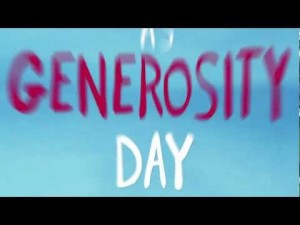
Sasha Dichter was a guest on my show early last year. During the hour in the studio, he shared professional insights revealing that he thinks about the business of philanthropy as few professional fundraisers do.
Sasha was director of business development for Acumen Fund at the time. Just his title betrayed a different orientation. Anywhere else he would have been director of development, or some such. Today, aptly, he is Acumen’s chief innovation officer.
He revealed a personal insight that he wasn’t as generous as he ought to have been. So he rebooted Valentine’s Day 2011 as Generosity Day, encouraging others through blogs, Twitter, YouTube, etc. to consider their own approach to giving and generosity throughout the month, not just for the day. Generosity Day hit tens of thousands. It’s sure to reach many more this year.
That’s the history.
This month I’ve been trying to be more conscious to look for ways to help others when I’m not asked (tissue for a sniffling subway rider is a favorite) and to think “How can I?” rather than “Why I cannot!” when I am approached.
Something I began recognizing a few years ago and now incorporate into my speaking, is how good it feels to share your love with others–like sniffling commuters and restaurant servers and bathroom attendants and flight attendants and telephone customer service reps and even head hunters–in very ordinary, simple and routinely overlooked ways.
(How did head hunters ever get so maligned and marginalized?)
So many times each day you can show your love and be generous with just five syllables: “Hello, how are you?” It feels very good.
There’s nothing shameful about the glow and goose bumps that come from a simple act of kindness that I like to call “showing love.” It feels so good that Generosity Day could be Selfishness Day.
So on February 14th, and the rest of this month and the rest of the year, show your love in your own ways and revel in the good feelings.
You’ll go looking out for ways to repeat.
I think it is a brilliant idea!
it seems to me that in times of crisis it is better to start thinking in terms of “we” rather than “I” in the same way that communities have done since year ‘dot’ when times have been bad.
I have been trying to encourage a “See a need? Then fill it!” campaing locally, but this is a much better approach.